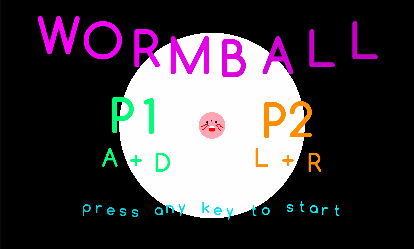- Worm Ball Chris Wade Mac Os Download
- Worm Ball Chris Wade Mac Os Catalina
- Worm Ball Chris Wade Mac Os 11
Windows - Mac OS - Linux - Android - (iOS version will be released later) Features. Online multiplayer (in development). At this stage, online matches are available only in P2P mode, without matchmaking server. This means that first player starts a room as host, and second player connects to that room by IP of first player.
Remember Corellium, the company that won a major lawsuit against Apple? The little-known security startup is back. The company that offers virtual iOS and macOS platforms, has successfully booted Linux Distro on Apple M1 Mac Computers running macOS.
Corellium has successfully installed and booted the ‘Groovy Gorilla’ iteration of Ubuntu on an Apple M1-based Macintosh or Mac PC. This effectively means that the new ARM-based Apple PCs can run macOS, Windows 10, and Linux Distros.
Apple silicon now the most versatile SoC as it boots ‘Groovy Gorilla’ Ubuntu 20.10 Linux Distro:
- Search the world's information, including webpages, images, videos and more. Google has many special features to help you find exactly what you're looking for.
- View Chris Wade’s profile on LinkedIn, the world’s largest professional community. Chris has 23 jobs listed on their profile. LDAP, Quark, IIS, Mac OS X. Web Developer (Contract) Free.
- Tomb Raider: The Last Revelation is an action-adventure video game developed by Core Design and published by Eidos Interactive.It first released for PlayStation and Microsoft Windows in 1999, then on Dreamcast and Mac OS the following year.
Whenever Apple launches a product with its own hardware, consumers worry. This is because Apple prefers a highly closed and cordoned off software ecosystem.
Needless to add, when Apple launched the new Apple MacBook, MacBook Air, and Mac Mini PCs with its in-house developed Apple M1 chipset, many experts thought that it represents the end for any further device customization. In other words, with Apple making even the CPU/GPU, the company could effectively lock-up the ecosystem even more.
Linux is now 'fully usable' on Apple Silicon M1 Macs AppleInsider https://t.co/dKxYqmK3uI

— Luis Cerdas Ross (@luiscerdas) January 20, 2021
There are many examples that demonstrate how heavy-handedly Apple wants to control its entire hardware and software ecosystem. However, instead of doubling down on Apple’s control, the Apple M1 chipset appears to have gone the opposite way.
Seems that Bloodhound on the M1 is quite usable on an emulated Linux (via qemu-system-aarch64 or parallels) since neo4j has no native support for Apple M1 right now
Setup is quick and easy on Ubuntu-20.10 aarch64 pic.twitter.com/BrIiXGgkZH
— 💾 Astr0 Baby (@astr0baby) January 20, 2021
Quite recently, researchers managed to install and run Windows 10 on an Apple M1 SoC-based Mac Min. Surprisingly, the Microsoft Operating System reportedly ran better on the M1 SoC, than it does on Microsoft’s own ARM-based chipset, the SQ2.
Now, researchers from Corellium, a startup company based in Florida, working on ARM device virtualization, have taken customization on Apple M1, even further. Researchers at the company have managed to get Linux running on Apple’s M1 custom silicon-based devices.
What works and what doesn’t of ‘Groovy Gorilla’ Ubuntu 20.10 port on an Apple M1 Mac:
The CTO of Corellium, Mr. Chris Wade, has announced that Linux is now fully usable on M1 silicon. Interestingly, the Linux Distro, which appears to be the ‘Groovy Gorilla’ Update of Ubuntu 20.10, can take full advantage of the CPU.
Corellium has indicated that the Linux port is not able to take full advantage of GPU hardware acceleration. In other words, the port cannot tap into the Apple M1’s integrated GPU. The Linux Distro has to rely on software rendering mode for graphics.
Linux is now completely usable on the Mac mini M1. Booting from USB a full Ubuntu desktop (rpi). Network works via a USB c dongle. Update includes support for USB, I2C, DART. We will push changes to our GitHub and a tutorial later today. Thanks to the @CorelliumHQ team ❤️🙏 pic.twitter.com/uBDbDmvJUG
— Chris Wade (@cmwdotme) January 20, 2021
Interestingly, Corellium has indicated that merely porting a Linux Distro as a “Proof of Concept” is not its intention. The company intends to improve and optimize the Linux Distro for smooth operation.
Moreover, Corellium plans to take the changes it made upstream to the Linux kernel itself. This means there could be an open-source and permissive license model for running a Linux Distro on Apple M1-based hardware in the near future.
The most threatening aspect of computer worms as a type of malware is that they are self-replicating. Where viruses sometimes need to hook up to a specific type of computer program or be actively controlled by a hacker in order to work, worms are so dangerous because they start cloning themselves pretty much the moment they hit your computer. The goal of worms is twofold: first, they seek to exploit known vulnerabilities in an operating system; second, they seek to spread as far as they can, using computer networks, email attachments, file sharing networks, and any number of other methods to move from one computer system to the next.